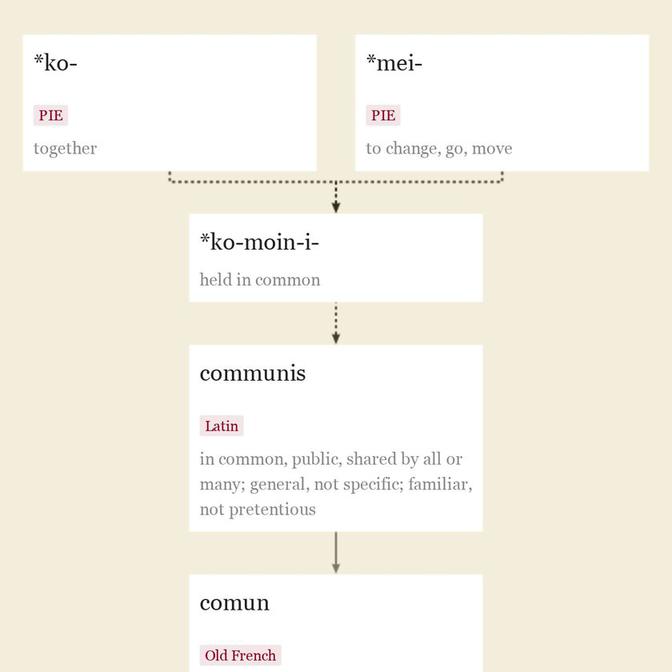excommunication (n.)
"割断或排斥与他人的联系,剥夺交往或交流的特权",特指正式将某人从宗教交往和特权中排除在外,15世纪中期,源自拉丁语 excommunicationem(主格 excommunicatio),是 excommunicare 的动名词,意为"将某人排除在社区之外",在教会拉丁语中则指"将某人从交往中驱逐出去",由 ex "出"(见 ex-) 和 communicare "分享,交流"组成,与 common(形容词)的 communis 有关。
excommunication 的相关词汇

公元1300年左右,“belonging to all, owned or used jointly, general, of a public nature or character”一词源自古法语 comun “common, general, free, open, public”(9世纪,现代法语 commun),源自拉丁语 communis “in common, public, shared by all or many; general, not specific; familiar, not pretentious.” 这是从重建的原始印欧语 *ko-moin-i- “held in common”中得出的,这是一个由 *ko- “together”和 *mei-(1)的词根的后缀形式 *moi-n-, 组成的复合形容词,因此字面意思是“shared by all”。
该复合词的第二个元素也是拉丁语 munia “duties, public duties, functions”的来源,这些职责与 munia “office”有关。也许在古法语中受到了原始印欧语 *ko-moin-i- 的日耳曼形式的加强(比较德语 gemein,古英语 gemne “common, public, general, universal”; 参见 mean(adj.)),这些形式通过法兰克语传入了法语。
自公元1300年以来,该词被用来贬低妇女和罪犯。意思是“pertaining equally to or proceeding equally from two or more”源自公元1400年左右。意思是“usual, not exceptional, of frequent occurrence”源自14世纪晚期。意思是“not distinguished, belonging to the general mass”源自公元1400年左右; 对于事物来说,“ordinary, not excellent”源自14世纪晚期。
Common pleas 是13世纪的,来自盎格鲁-法国语 communs plets,指一个主体对另一个主体提起的民事诉讼,与王室诉讼相对。 Common prayer 是与其他敬拜者一起公开进行的祈祷,与私人祈祷相对。 Common stock 出现于1888年。 Common speech(14世纪晚期)是指白话,与拉丁语相对。 Common good(14世纪晚期)翻译自拉丁语 bonum publicum “the common weal.” 学院的 common room(1660年代)是所有成员都可以共同使用的房间。
这是一个词缀,在英语中通常表示“从……中出来”,但也可以表示“向上,完全,剥夺,没有”和“前者”; 源自拉丁语 ex,意为“从……中出来; 从那时起,自从; 根据; 关于”,源自原始印欧语言 *eghs,意为“出来”(也是高卢语 ex-,古爱尔兰语 ess-,古教会斯拉夫语 izu,俄语 iz 的来源)。在某些情况下,也来自希腊语同源词 ex, ek。原始印欧语言 *eghs 有比较级形式 *eks-tero 和最高级形式 *eks-t(e)r-emo-。在某些情况下,缩写为 e-,在 -b-, -d-, -g-,辅音 -i-, -l-, -m-, -n-, -v- 前(如 elude, emerge, evaporate 等)。
“动、走、移”的原始印欧语根,“派生词涉及由习俗或法律所规范的社会内物品和服务的交换” [Watkins]。
构成以下词语或部分词语: amiss; amoeba; azimuth; common; commune; communicate; communication; communism; commute; congee; demean; emigrate; emigration; excommunicate; excommunication; immune; immutable; incommunicado; mad; mean (adj.1) “质量低劣的”; mew (n.2) “笼子”; mews; migrate; migration; mis- (1)“坏的,错误的”; mistake; Mithras; molt; Mstislav; municipal; munificent; mutable; mutant; mutate; mutation; mutatis mutandis; mutual; permeable; permeate; permutation; permute; remunerate; remuneration; transmutation; transmute; zenith。
源自假设形式而实证存在的包括但不限于以下语言:梵语 methati “变化,交替,相遇”; 阿维斯塔语 mitho “扭曲的,错误的”; 赫梯语 mutai- “转变为”; 拉丁语 mutare “改变”, meare “去,经过”, migrare “从一个地方移动到另一个地方”, mutuus “用交换的方式完成”; 古教堂斯拉夫语 mite “交替的”; 捷克语 mijim “走过,经过”; 波兰语 mijać “避免”; 哥特语 maidjan “改变”。